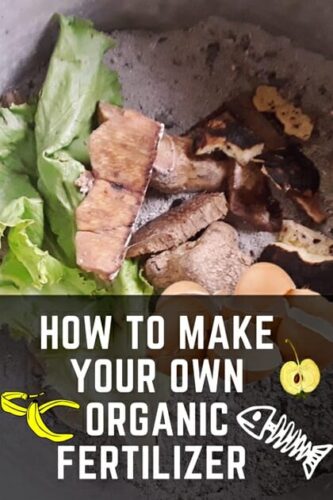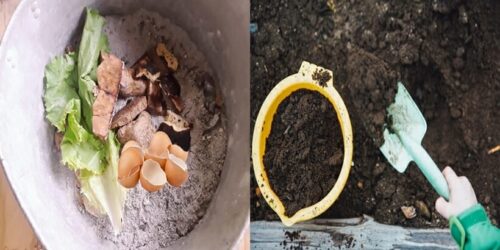It is a no-brainer on how to make homemade organic compost for your garden plants.
Making your own garden compost at home is quite easy; all you need are your kitchen waste materials.
So, what are these materials?
For example, these include but are not limited to, eggshells, vegetable peels, such as bananas, onions, etc., and the properties of sandy soil combined in a mixture.
Basically, any scraps from fruits and vegetables you always thought of throwing away in the kitchen bin.
Eggshells contain calcium, which is quite useful to many plants. Many people use eggshells as a starting point to germinate young crops.
The reason why banana peels are essential to homemade garden compost is because of the rich potassium and phosphorus they contain, which aid plant flowering.
Onions are rich in magnesium and have a lot of other properties that would be helpful to plants, just like store-bought organic fertilizer.
To make homemade organic compost, you should put all your kitchen compost, fruit scraps, and vegetable scraps in a bin, along with some dried leaves.
In a few weeks, all the mixture in the container will break down and form compost, or, rather, super homemade organic compost.
The compost will be ready in one month and you can apply that compost to plant roots and seed-starting cells.
Another way to make super compost is to save your kitchen scraps, preferably vegetable scraps.
Then take the veggie scraps and grind them up in a blender. Afterward, throw the blended mixture between the rows of your crops and use a hoe to work them into the garden soil.

Homemade Organic Compost
How Do You Make Your Own Organic Fertilizer for Plants?
It’s quite simple to make your own homemade natural organic fertilizer because it is easy and cheap at the same time.
For homemade organic fertilizer, use components you already have in and around your home.
These components include Organic material from leftover food and grass clippings, as well as organic fertilizers made from plant or animal waste.
Your plant-based homemade fertilizers should include cottonseed meal, compost, soybeans, seaweed, kelp, etc.
How To Make Compost Tea Recipe
First, fill a 5-gallon container 1/3 of the way with good-quality finished compost from the compost pile.
Then, fill the 5-gallon bucket with water a few inches from the top.
Allow the mixture to marinate for 3 or 4 days.
Stir the mixture often during the 3- to 4-day period.
Afterward, strain the mixture with a porous fabric, and pour the remaining compost into your garden or carry the wet compost back to its pile.
Next, dilute the remaining liquid organic fertilizer to a ratio of 10:1 water to tea.
Then spray the remaining mixture over your crop leaves with a sprayer.
How To Make Lawn Fertilizer and Weed Fertilizer Recipe
First, fill a 5-gallon container with 2/3 of the fresh grass clippings.
Apply a few inches of water to the container.
Allow the mixture to sit for approximately 3 days at room temperature, and stir the mixture at least once a day for 12 hours.
After 3 days, strain the liquid and dilute this liquid fertilizer with equal parts of water.
Then, spray the rich nutrient content mixture over leaves for rapid plant growth.
How To Make Vinegar Fertilizer Recipe
Did you know that vinegar and acetic acid work very well for plants that love acid? Yes! It is used as a replacement for rose plant food or houseplant fertilizers. However, always test first.
First, mix 1 gallon of water and 1 tablespoon of white vinegar together.
Apply this mixture to your plants and repeat every 2–3 months. And there you have homemade vinegar fertilizer.
What is the difference between organic and bio-fertilizers?
Organic fertilizer consists of animal excreta and human excreta, along with vegetable matter such as compost and crop residues.
Also, when it comes to organic fertilizers, animal wastes from meat processing include peat, manure, slurry, and guano.
Bio-fertilizer, on the other hand, is a substance that contains living microorganisms.
When microorganisms are applied to seeds, plant surfaces, or soil, they colonize the entire interior of the plant and promote growth by increasing the supply of vital nutrients to the host plant.
If you are practicing organic gardening, soil that is very rich in nutrients and humus is most suitable for growing nice vegetables, fruits, and ornamental plants.
However, overall, the fertility and feasibility of your soil are better than applying fertilizers as quick fixes. It’s the best way to carry out organic gardening.
A healthy plant needs healthy soil. The soil must provide all the organic nutrients necessary for the proper growth of the plant. Fertilizers are only temporary fixes.
What do plants need for healthy growth?
The essential components or requirements plants need for healthy growth are air, light, warmth, water, and nutrients to sustain their health.
However, if the plant doesn’t have one of these requirements, it could affect its growth or possibly die.
To be more clear, plants that are kept in a dark place will grow tall and spindly in search of light, then become weak over time and die.
Fertilizers are the best way to increase the fertility of the soil. Fertilizers are of two kinds: organic and chemical fertilizers.
Organic Fertilizers
Organic fertilizer’s properties are mainly made up of all the natural ingredients, such as animal matter, animal waste, vegetable matter, and crop residues.
Organic fertilizers add the missing or required nutrients to the plant and also enhance the fertility of the garden soil by increasing the solid structure and promoting water-holding capacity.
Chemical Fertilizers
Chemical fertilizers, on the other hand, are generally manufactured from synthetic elements (chemicals) that usually enhance nutrients in the soil and promote plant growth of the plant.
How Does an Organic Fertilizer Work?
Organic fertilizers work by emancipating nutrients in a slow way, which provides a constant flow of natural elements to the plant.
Organic nutrients found in the fertilizer are not harmful to the roots of the plant.
Moreover, organic fertilizers also improve soil structures and water holding capacity, increase fertility, and develop earthworms and microorganisms in your farm or garden soil.
The best thing about organic fertilizer is that it enhances soil fertility for a longer period of time and maintains chemical imbalances permanently.
How Do Chemical Fertilizers Work?
Chemical fertilizers work best on the soil and plants immediately, or rather faster than organic fertilizers.
However, if used, chemical fertilizers will destroy all organic ingredients in the soil.
Nevertheless, salts in chemical fertilizers will make the soil more acidic and destroy earthworms, unfortunately.
Why Do Farmers Use Organic Fertilizers?
The reason why most farmers use organic fertilizers is that they do not make a crust on the soil, unlike their inorganic counterparts.
Organic fertilizers improve the soil’s water and air movement and also serve as food for the soil, making the soil an easier place to dwell for living things.
The nutrients in organic fertilizers are released slowly, however, at a consistent rate suitable for the plant.
Why is it important to use organic fertilizer?
When it comes to organic fertilizer, the first thing to understand about these products is that they do not feed plants directly.
Organic fertilizers are food that feeds the microbes living in the garden soil, and when the microbes are well fed, they create plant food.
Here are a few reasons why you should consider using organic fertilizer:. I have used them for years now.
1) When it comes to organic fertilizer, microbes work together to soften the garden soil by separating mineral particles.
2) When the microbes in the garden soil are well fed, they take care of organic waste materials.
3) Microbes in the soil create humus, which is a stored form of unused plant food.
4) The microbes in the soil retain nutrients for later release and use by plants. Chemical fertilizer, however, just washes through the soil.
5) Microbes also work together to push the garden soil pH toward 7.0 and hold it there; this is one of the reasons why you should use organic fertilizer.
6) When it comes down to the use of organic fertilizer, you cannot overfertilize plants with organics.
These are some of the easiest ways to make homemade organic compost and homemade organic fertilizer, and their benefits. I hope this post helped you find what you were looking for. Cheers!
Related post: Fruit Salad Recipe




